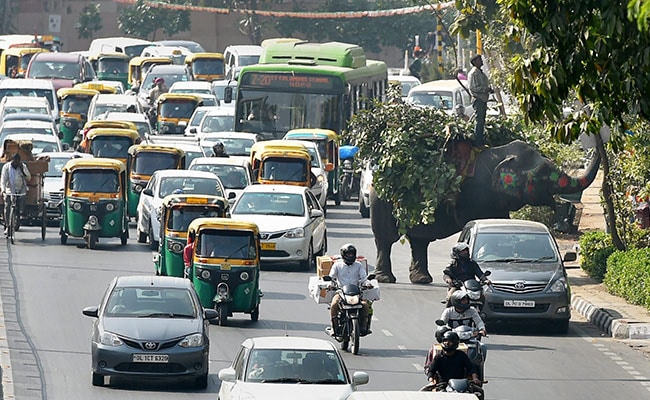- September 4, 2023
Explained | The global push to make ecocide a crime
The story so far: Mexico’s Maya train project has earned a contradictory reputation. Some describe it as a “Pharaonic project”, the train route covers 1,525 km (about the distance from Florida to New York City), connects tourists in the Caribbean with historic Maya sites and costs $20 billion (almost four times India’s Great Nicobar Project). It has also been described as a “megaproject of death” — it imperils the Yucatán peninsula’s rich wilderness, ancient cave systems and indigenous communities. The Tribunal for the Rights of Nature in August said the project caused “crimes of ecocide and ethnocide”.
Ecocide, derived from Greek and Latin,translates to ‘killing one’s home’ or ‘environment’. Such ‘killing’ could include port expansion projects that destroy fragile marine life and local livelihoods; deforestation; illegal sandmining; polluting rivers with untreated sewage. Mexico joins several nations that are mulling ecocide legislations — Congresswoman Marina Marlen Barrón Perales recently proposed a Bill to criminalise any “unlawful or wanton act committed with the knowledge that there is a substantial likelihood of severe and either widespread or long-term damage to the environment”. There is also a push to elevate ecocide to the ranks of an international crime, warranting similar legal scrutiny as genocide.
What is ‘ecocide’?
Biologist Arthur Galston in 1970 is credited be the first to link environmental destruction with genocide, which is recognised as an international crime, when referring to the U.S. military’s use of Agent Orange (a herbicide) during the Vietnam War. Swedish Prime Minister Olof Palme, two years later, used the term in a speech at the United Nations, warning that unchecked industrialisation could cause irreversible damage to the environment. British lawyer Polly Higgins became the linchpin, when in 2010, she urged the United Nations’ International Criminal Court (ICC) to recognise ecocide as an international crime.
At present, the Rome Statute of the ICC deals with four atrocities: genocide, crimes against humanity, war crimes and the crime of aggression. The provision on war crimes is the only statute that can hold a perpetrator responsible for environmental damage, albeit if it is intentionally caused and during wartime situations.
Ms. Higgins proposed that the Statute should be amended to treat crimes against nature on par with crimes against people. Her description of ecocide was: “Extensive loss, damage to or destruction of ecosystems…such that the peaceful enjoyment by the inhabitants has been or will be severely diminished.” Here, “inhabitants” applies to all living creatures, not limiting crime to an anthropogenic legal view.

Ecocide as defined by the Stop Ecocide Foundation.
There is no accepted legal definition of ecocide, but a panel of lawyers in June 2021 for Stop Ecocide Foundation prepared a ‘historic’ 165-word articulation that, if accepted, would locate environmental destruction in the same category as crimes against humanity. Ecocide, they proposed, is the “unlawful or wanton acts committed with knowledge that there is a substantial likelihood of severe and either widespread or long-term damage to the environment being caused by those acts.”
Why should ecocide be a crime?
Ecocide is a crime in 11 countries, with 27 other nations mulling laws around criminalising environmental damage that is wilfully caused and harms humans, animals and plant species. The European Parliament voted unanimously this year to enshrine ecocide in law. Most national definitions penalise “mass destruction of flora and fauna”, “poisoning the atmosphere or water resources” or “deliberate actions capable of causing an ecological disaster.” The ICC and Ukraine’s public prosecutor are investigating Russia’s role in the collapse of the Nova Kakhovka dam, which unleashed a catastrophic flood drowning 40 regions, and caused oil spillage and toxic leakage into the Black Sea.
Ecocide laws, at one level, act as legal instruments to plug a lacuna in environmental protection. “None of the existing international criminal laws protect the environment as an end in itself, and that’s what the crime of ecocide does,” Philippe Sands, professor of international law at University College London and co-chair of the panel that drafted the definition, said in 2021.
The movement also responds to harsh climate realities. Over one-third of the Earth’s animal and plant species could be extinct by 2050; ‘unprecedented’ heat waves have broken records globally; changing monsoon patterns and anthropogenic causes have made floods the norm in States like Assam. The Intergovernmental Panel on Climate Change reiterated in March that global climate action is “insufficient”; indiscriminate burning of fossil fuels, polluting land and waterways with plastics and fertilisers, and species loss have pushed us to a new geological epoch, the Anthropocene. Criminalising ecocide “can lead to a shift in social norms”, experts Alexandre Antonelli and Pella Thiel argue in an article.
An amendment to the Rome Statute could have a ‘catalysing’ impact across nations to formulate their own laws; individual nations enshrining ecocide in their legislation could, in turn, build up pressure on the ICC.
Nabeela Siddiqui, an expert in environment constitutionalism, explains the purpose of ecocide laws is to define the ‘significant harm’ and the consequences of the harm ensuing due to environmental damage, weaving in accountability and liability. Deforestation of the Amazon, deep-sea trawling or even the catastrophic 1984 Bhopal Gas tragedy could have been avoided with ecocide laws in place, per Stop Ecocide International.
Laws can hold individuals helming corporations accountable and possibly deter environmental damage. “That something is morally questionable usually doesn’t hinder investment. Laws provide boundaries and sanctions for investment, as no company or organisation – such as the World Bank – would want to invest in something potentially criminal,” Mr. Antonelli and Ms. Thiel wrote. A 2019 analysis found that 20 fossil fuel companies were responsible for a third of carbon emissions despite being aware of the industry’s hazardous impact.
Ecocide laws could also double as clarion calls for justice for low- and middle-income countries disproportionately shouldering the impact of extreme weather. Small nation-states like Vanuatu and Barbuda are lobbying for the ICC to declare crimes against the environment as violations of international law.
There’s also a symbolic impact in equating a crime against nature to a war crime. Among other things, it changes the way nature is valued — undoing an anthropocentric legal view and acknowledging that ecosystems are deserving of protection by themselves, activists say.
Some Indian judgments have affirmed the legal personhood of nature by recognising rivers as legal entities with the right to maintain their spirit, identity and integrity.
“An ecocide law is part of that broader process of changing public consciousness, recognising that we are in a relationship with our environment, we are dependent for our well-being on the wellbeing of the environment, and that we have to use various instruments, political, diplomatic but also legal to achieve the protection of the environment”Philippe Sands, professor of international law at University College London, in an interview
Limitations of defining ecocide
Arguments against ecocide laws are varied: some question the need for a separate law, others question the definition of ‘ecocide’ itself.
Experts argue the 2021 definition is ambiguous andsets the threshold too low for implicating an entity. Words like “long-term” or “widespread damage” are abstract and leave room for misinterpretation, Prof. Siddiqui explains. The definition describes ‘wanton’ as damage “clearly excessive in relation to the social and economic benefits anticipated.” This constructs a development-versus-environment narrative, she adds, with the implication that it is okay to destroy the environment as long as it benefits humans. Case in point- activists criticised the Great Nicobar Project for imperilling indigenous communities and biodiversity; the government claims the Project is in service of “holistic development.”
Also read | A grave mistake in Great Nicobar
The threshold to prove an ecocide may simultaneously be too high, others worry. Polish lawyer Raphael Lemkin in the 1940s proposed a law against ‘genocide’ to prosecute individuals who killed members of a national, ethnic, racial, religious or political group. But the final law requires proof on two accounts —mens rea (an intention to kill) and actus reus (a guilty act) — to prove a crime was committed.
Mr. Sands in an interview noted a high burden of proof would make it impossible to show “that someone intended to destroy the environment on a massive scale.” Countries like Belarus and Moldova specify “intentional” or “deliberate” destruction; however, “environmental disasters are not caused intentionally or deliberately,” argued Bianca Cassandro, an international law professor, in an article. “This wording… may have the effect of limiting, if not excluding, the liability of corporations’ top managers’ and Governments’ officials’,” she writes.
The ICC in itself has limited legal powers, and has a speckled track record when it comes to converting prosecutions into convictions. The court’s power is limited to “natural persons,” and without any changes, ICC would be unable to hold corporate entities criminally liable.
Moreover, “Even if you’re able to define ecocide, how will you define the idea of jurisdiction?” asks Prof. Siddiqui. Experts note most ‘crimes’ are transnational in nature; corporations have private or state-owned corporations in other countries (which are not members of the Rome Statute) that are responsible for polluting activities. For example, Coca-Cola was accused of poisoning the land in India with waste sludge and pushing thousands of farmers out of work by draining the water that feeds their wells.
What has been India’s stance?
Some Indian judgments have used the term ‘ecocide’ in passing, but the concept hasn’t fully materialised in law. In Chandra CFS and Terminal Operators Pvt. Ltd. v. The Commissioner of Customs and Ors, the Madras High Court noted, “… the prohibitory activities of ecocide has been continuing unbridledly by certain section of people by removing the valuable and precious timbers…”
The ongoing T.N. Godavarman Thirumulpad vs Union Of India & Ors case in Supreme Court called attention to an “anthropogenic bias” and argued that “environmental justice could be achieved only if we drift away from the principle of anthropocentric to ecocentric.”
India’s environmental regime includes the Environmental (Protection) Act of 1986, Wildlife (Protection) Act of 1972, and Compensatory Afforestation Fund Act, 2016 (CAMPA) as well as separate rules to prevent air and water pollution. According to Prof. Siddiqui, these separate laws have to be consolidated into a code, and institutions need to be streamlined, for debates like ecocide and rights of nature to find “their proper way through legal channels”.
Further, the National Green Tribunal, India’s apex environmental regulatory body, does not hold jurisdiction to hear matters relating to the Wildlife (Protection) Act, 1972, the Indian Forest Act, 1927 and other State-enacted laws. Mining in Chambal, or even the Himachal floods, qualify as being environmental crimes under the current articulation, Prof. Siddiqui says. “But how would one go about addressing this, considering the institutions in the way?”
Indian laws are themselves in a state of conflict: the Indian Parliament passed the controversial Forest Conservation (Amendment) Bill, 2023 and Biodiversity (Amendment) Bill, 2023, which experts say can dilute current legal protections and will lead to the loss of 20%-25% of forest area in the country.
Prof. Siddiqui notes a critical challenge is to tackle problems of liability and compensation — an example of the “friction between committing to environmental protection and actual action.” For example, Bhopal gas tragedy survivors are still fighting for compensation; the disaster’s aftermath is sketched by an intergenerational impact on health and mass-scale contamination of soil and groundwater. Investigations have found misuse and diversion of funds earmarked for CAMPA. But despite the National Green Tribunal having slapped fines worth ₹28,180 crore on seven States, there is little clarity on the total fines collected and the way they were used, per a 2022 report in Down to Earth.
“Even before ecocide laws come up internationally, India needs to first bring its [environmental] laws in tune with the idea of ecocide,” she says.







